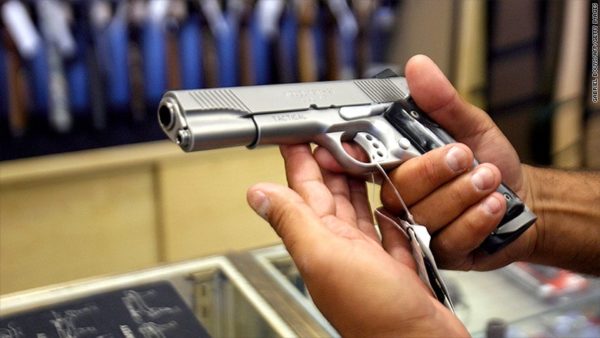
Former President Obama tightened the background-check system for gun purchases following the Sandy Hook shooting in 2012.
The GOP Congress just made it easier for people with mental disabilities to get their hands on a firearm.
The Senate voted 57-43 on Wednesday, Feb. 15, to block an Obama-era regulation that would’ve prevented an estimated 75,000 people with mental disorders from being able to purchase a gun, The Associated Press reported. The rule, created as part of Obama’s strengthened background-check efforts following the 2012 Sandy Hook massacre, is the latest move by a Republican-controlled Congress to roll back statutes implemented by the former president.
The House went ahead and approved the measure two weeks ago and White House officials indicated that newly elected President Donald Trump is slated to sign the legislation soon, according to NPR.
Critics of Obama’s regulations, including the National Rifle Association and advocacy groups for the disabled, have pushed Congress to spearhead a rarely successful course of action designed to void policies congressional members find issue with. The process, established under the Congressional Review Act, essentially quashes a regulation when a simple majority of both the House and Senate pass a joint resolution of disapproval and the president signs it, according to the Associated Press.
One contested measure of the Obama-era regulation was the requirement of the Social Security Administration to send in the names of beneficiaries with mental disabilities to the FBI’s National Instant Criminal Background Check System. Those who had a third party overseeing their benefits or were deemed incapable of handling their financial affairs would have been prevented from purchasing a firearm.
Critics like Sen. Charles Grassley (R-Iowa), who lead efforts to repeal the measure, argued that Obama’s regulations violated the 2nd Amendment rights of mentally disabled persons. Moreover, he said the variety of mental disorders described in the rule were chock full of “vague characteristics that do not fit into the federal mentally defective standard” and cited sleep and eating disorders as examples of illnesses that may have prevented someone from owning a gun.
“If a specific individual is likely to be violent due to the nature of their mental illness, then the government should have to prove it,” Grassley said.
The American Civil Liberties Union even contested Obama’s gun-control legislation, arguing that the measure further fueled negative stereotypes that people with mental disabilities are dangerous or violent. Nearly a dozen other advocacy groups for the disabled also took issue with the regulations, the news wire service reported.
On the other end of the gun-control spectrum is Sen. Chris Murphy (D-Conn.), who argued that Congress’ latest move puts more Americans at risk by making easier for mentally ill people to get their hands on guns.
“If you can’t manage your own financial affairs, how can we expect that you’re going to be a responsible steward of a dangerous, lethal firearm?” Murphy asked.
Dan Gross, president of the Brady Campaign to Prevent Gun Violence, echoed Murphy’s sentiments, adding that the new measure was likely just another way for the gun industry to line its pockets.
“This heartless resolution puts the most vulnerable Americans at risk,” Gross said. “Make no mistake, this vote was really about deepening the gun industry’s customer pool at the expense of those in danger of hurting themselves or others.”
Sen. Ron Wyden (D-Ore.) argued that anyone who felt they were being treated unfairly under Obama’s statute had the right to appeal and would likely win, so long as they could prove they weren’t a threat to themselves or those around them.


